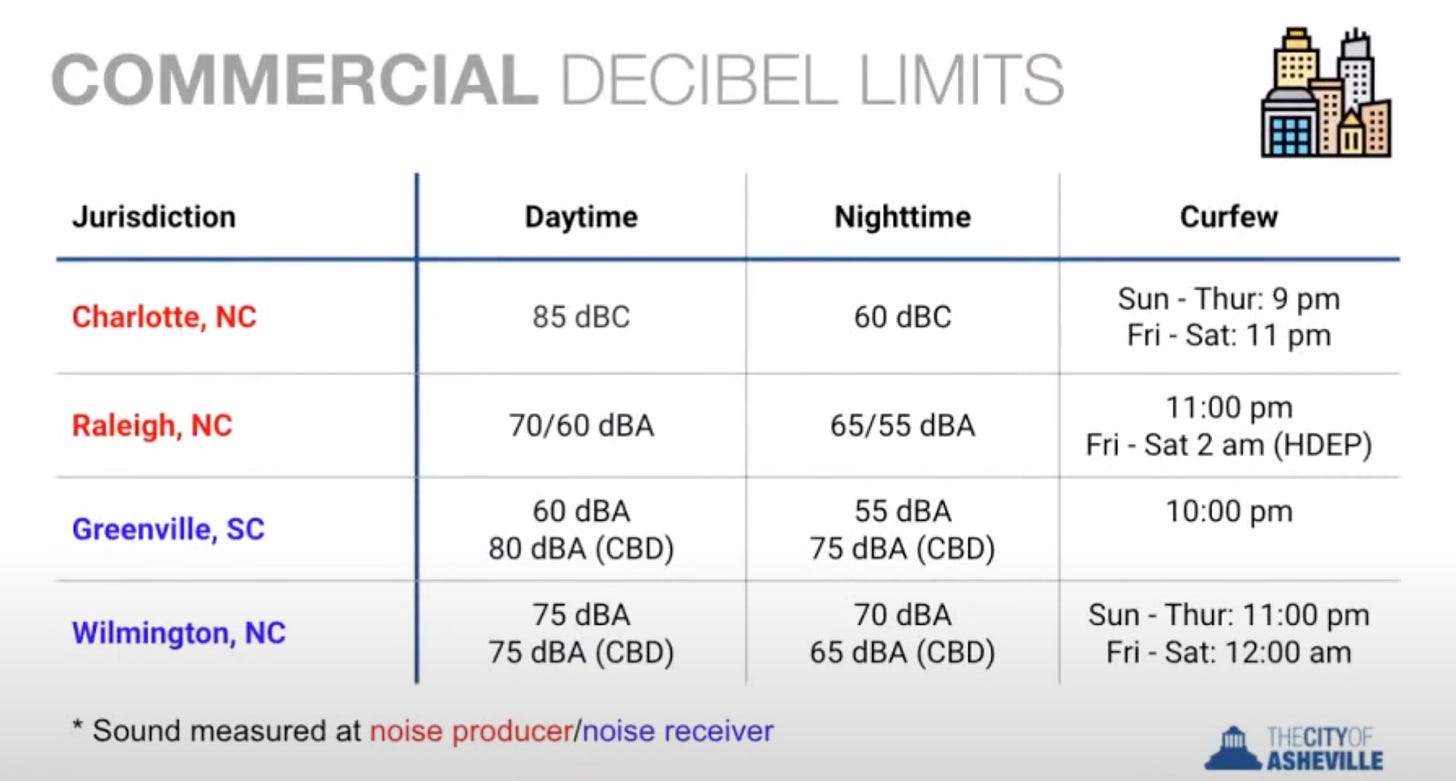Status update: Asheville noise ordinance revisions and where issue stands as City Council takes it up
Understanding proposed changes and power dynamics at play as Asheville City Council nears vote on noise ordinance revisions after two years of community debate
Note: This story sponsored by Citizens Fuel Co., a family-owned Asheville company.
Asheville City Council is finally nearing a vote on proposed revisions to its noise ordinance after more than two years of community debate and discussion. The topic is scheduled to be presented to City Council at its meeting Tuesday (June 22). There’s no vote planned on Tuesday, and there’s no public comment period scheduled.
Here’s a “white paper” approach to understanding the issue and some of its complexities, including knowing a couple of key groups fighting over the noise ordinance.
Calls for change: Citizens started asking for noise ordinance changes back in 2018. Residents of downtown and the Montford and Kenilworth neighborhoods complained about increased noise from commercial businesses, including music venues, and said police often failed to follow through with enforcement. The city attorney at the time proposed that noise violations be punished as criminal infractions rather than civil penalties, making the court system responsible for collecting fines. He also said a city board dealing with noise issues was ineffective at resolving noise disputes and suggested it be dismantled.
A number of residents strongly objected to those changes, noting that moving enforcement deeper into the realm of police and court actions was unfair and unnecessary. City Council pulled back and started a community discussion that Councilwoman Kim Roney recently called one of the city’s most extensive public engagement efforts.
Understanding the nature of noise complaints: The city has extensive data indicating the location and type of most noise complaints, most of it collected from calls logged by the Police Department and Animal Services Department. Residents are complaining about noise from: construction; garbage collection; vehicle exhaust/revving; commercial and industrial equipment; music over-amplification, venues, outdoor events and buskers; fireworks; other residential neighbors; dogs and animals. (In terms of numbers, complaints about music venues ranks near or at the bottom of the the list.) Most city noise complaints are generated from the central business district, with residential areas, including apartment complexes, ranking right behind that.
Where things stand right now: It’s important to understand these revisions place a high value on a collaborative approach that seeks to address noise issues outside of traditional policing and in a way that promotes racial equity.
The latest ordinance revisions would move most enforcement out of the Asheville Police Department’s purview and place it under the umbrella of the city’s Development Services Department. Animal Services would handle barking dog complaints, and the Police Department would handle noise complaints about vehicle exhaust/revving.
Key point: The revisions would add an objective decibel standard to an ordinance that currently sets forth only a more subjective standard.
In addition, the Development Services Department (which would have to hire staff to manage the noise ordinance) would create an overall programatic approach to the noise issue, one that emphasizes education and helping businesses and residents become better neighbors. Enforcement would come in the form of written warnings and citations from the Development Services Department or Police Department, while penalties and revocations could be applied to a new “sound exceedance” permit system (more on that below.) A new Noise Advisory Board would be empaneled.
Asheville City Council’s Public Safety committee voted June 1 to move forward with a higher decibel reading than was put forth by city staff - in other words, a more lenient approach to noise. (see below for details). Finally, full implementation would be delayed to give city staff time to adjust and evaluate the changes.
Ordinance nuts and bolts
In that June 1 meeting, Development Services Department Director Ben Woody told City Council’s Public Safety Committee - Sheneika Smith, Sandra Kilgore and Kim Roney - that he was proposing a two-fold approach to noise issues:
Complaints coming from a central business district, commercial or industrial district would be subject to an objective decibel standard, as measured at a neighbor’s property line or at the place of impact on a neighbor’s property. That decibel level in the city’s central business district would be 72 dBA for daytime hours of 7 a.m. to 10 p.m. and 67 dBA for nighttime hours of 10 p.m. to 2 a.m., according to Woody, who proposed a standard of 57 dBA for the late night hours of 2 a.m. to 7 a.m.
Noise complaints from residential districts, right of ways and public spaces would fall under a more subjective noise disturbance standard. While decibel levels could still be measured in this instance, “volume is not the sole determining factor,” Woody said, with the frequency and duration of the noise also considered.
Reasoning: Right now, the city noise ordinance uses only the more subjective noise disturbance standard, which can be hard to enforce on the commercial side, Woody explained. Adding an objective decibel level and a more proactive approach of working with residents and businesses is the better approach, he added.

The city dropped a provision requiring a “music venue permit” for noise after significant pushback from local venue owners, bars and breweries. Instead, the new noise rules require a “sound exceedance permit” system for venues or nonprofits staging events. The number of permits a venue or organization apply for fall into tiers, and the more permits that are sought, the higher the requirement for planning and mitigation. Read the revised noise ordinance as proposed by Woody here, and note that the Public Safety Committee decided to go with higher decibel levels than are shown. (I’m getting to that, I promise.)
Regarding McCormick Field: The city has received numerous complaints about the noise from fireworks at historic McCormick Field, according to Woody, who reminded the Pubic Safety Committee that McCormick Field is completely exempt from current noise regulations. City officials have worked with the Asheville Tourists baseball team to come up with the following limitations on fireworks at the ballpark. Fireworks would be limited to: federal holidays; 12 events per year, Friday or Saturday and no later than 11:30 p.m. The Tourists also plan to test an advance notification system for neighboring properties, Woody said.
The power dynamics at work
The folks fighting over the ordinance right now generally fall into two categories: neighborhood groups and music industry groups.
The Coalition of Asheville Neighborhoods, an advocacy group that’s given voice to neighborhood concerns for more than 30 years, has been active in this discussion from the beginning, as has a group specifically representing residents living in the central business district. They’re pushing for much lower decibel levels - in the range of 45 dBA. That’s a standard based on guidelines developed by the World Health Organization, which has studied noise pollution’s negative effects on human health, according to an opinion piece written by coalition chairman Rick Freeman.
Music venue owners, the Asheville Busker Collective and the nonprofit advocacy group Asheville Music Professionals, established in 2014 and 2015 respectively, got energized late last year. This camp’s key argument is that any new regulations right now would pose an existential threat to their economic viability, especially in light of the past year’s financially draining pandemic shutdown and the fact that they’ve moved to more outdoor music options as a result.
The argument from music industry groups appears to be holding sway for now. Using their connections and the organizing power of social media, they’ve bombarded City Council with calls and emails. Councilwoman Roney cited their economic argument in making her motion on June 1 to go with a decibel level of 75 dBA for daytime hours and 70 dBA for nighttime hours, rather than the 72 and 67 dBA levels for daytime and nighttime suggested by staff. Smith and Kilgore joined Roney in approving the motion.
My take: The Asheville music industry is flexing some newfound muscle. It’s growing financially. It’s better organized. And it’s getting some sage advice from influential members such as industry veteran Michael Selverne, a producer, musician and executive who moved to town several years ago. “If we want to win this fight it needs to be far broader than the music community pushing back,” Selverne commented in one Facebook thread. “We need to involve as many diverse businesses and community members as we can enlist outside of music to support us and to speak out. This needs to be an issue of commerce for all Asheville businesses and an issue of culture for Ashevillians.”
More: A one-page summary of the city’s noise ordinance revisions is here, as submitted to the Public Safety Committee on June 1. The city of Asheville’s noise ordinance page is here, listing extensive background and supporting documents.
Thanks for reading.
-j





Great recap. ! I can tell you that 72 or 75 actually received at our condo - can be quite disturbing.
Some of us were hoping the noise would be measured routinely--at a distance from each noise generation- ie-- 10-15' from Buskers- 10-15' from bars- and 10-15' from automobiles. That gives each noise generator the same rules to follow and seems to be fair - as "uniform" for all- Under the present plan - I guess we need complain- and then the administrators come to where we live and take a measurement at our homes- then go back to the buisiness or band- and decide the amount of enforcement. If all noise was measured near the source- the administrator can measure and talk right there- and not require a citizen complaint- to act- a much better way to enforce-- in my opinion. So- if this passes similar to what is written- - I guess I will be inviting an administator up to my condo- to measure? I wish the administrators could just do the job- of lowering the noise level-- without our complaints.